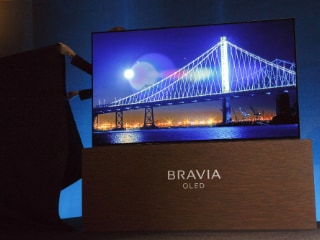- Home
- Wearables
- Wearables News
- Facebook Chief Scientist Says 'True AR Glasses' at Least Five Years Away
Facebook Chief Scientist Says 'True AR Glasses' at Least Five Years Away
Facebook announced on Wednesday that it was partnering with Ray-Ban maker EssilorLuxottica for its 2021 smart glasses launch.

Michael Abrash said fully interactive display couldn't yet be crammed into lightweight device like glass
Facebook is about five to 10 years away from being able to bring to market "true" augmented reality glasses, its chief scientist told Reuters, as the company released plans to launch a first generation product next year.
The world's biggest social media company announced on Wednesday that it was partnering with Ray-Ban maker EssilorLuxottica for its 2021 smart glasses launch.
It also announced a research project, Project Aria, to collect data that would support the development of more advanced glasses down the road.
Michael Abrash, who heads Facebook Reality Labs Research, said fully interactive display and audio capabilities could not yet be crammed into lightweight devices like glasses, which he estimated should be around 70 grams (2.5 oz) to be viable.Those capabilities include the ability for people to jointly see and interact with persistent shared virtual objects, like a virtual whiteboard on which they could collaborate, he said.
"Those glasses are still years off," said Abrash. "That's not a 2021 thing. I'm talking about the future."
A company spokeswoman said there would be no display in the initial 2021 product, which will work with and rely on mobile phones.
Many in the industry believe the glasses will eventually replace the functionality of mobile phones altogether, making their development a hotly contested race among tech giants like Apple, Amazon and Alphabet's Google.
Snap's "Spectacles," initially released in 2016, began incorporating AR elements in its third generation product last year.
Abrash said smart glasses would need to rely on devices like phones for the forseeable future due to constraints like battery life and the heat generated by processing.
But with "true AR glasses," he said, other devices would become "an accessory to the glasses, because the glasses are how you see and interact with the world."
© Thomson Reuters 2020
Is Android One holding back Nokia smartphones in India? We discussed this on Orbital, our weekly technology podcast, which you can subscribe to via Apple Podcasts, Google Podcasts, or RSS, download the episode, or just hit the play button below.
Catch the latest from the Consumer Electronics Show on Gadgets 360, at our CES 2026 hub.
Related Stories
- Samsung Galaxy Unpacked 2025
- ChatGPT
- Redmi Note 14 Pro+
- iPhone 16
- Apple Vision Pro
- Oneplus 12
- OnePlus Nord CE 3 Lite 5G
- iPhone 13
- Xiaomi 14 Pro
- Oppo Find N3
- Tecno Spark Go (2023)
- Realme V30
- Best Phones Under 25000
- Samsung Galaxy S24 Series
- Cryptocurrency
- iQoo 12
- Samsung Galaxy S24 Ultra
- Giottus
- Samsung Galaxy Z Flip 5
- Apple 'Scary Fast'
- Housefull 5
- GoPro Hero 12 Black Review
- Invincible Season 2
- JioGlass
- HD Ready TV
- Laptop Under 50000
- Smartwatch Under 10000
- Latest Mobile Phones
- Compare Phones
- Red Magic 11 Air
- Honor Magic 8 RSR Porsche Design
- Honor Magic 8 Pro Air
- Infinix Note Edge
- Lava Blaze Duo 3
- Tecno Spark Go 3
- iQOO Z11 Turbo
- OPPO A6c
- Lenovo Yoga Slim 7x (2025)
- Lenovo Yoga Slim 7a
- Lenovo Idea Tab Plus
- Realme Pad 3
- Moto Watch
- Garmin Quatix 8 Pro
- Haier H5E Series
- Acerpure Nitro Z Series 100-inch QLED TV
- Asus ROG Ally
- Nintendo Switch Lite
- Haier 1.6 Ton 5 Star Inverter Split AC (HSU19G-MZAID5BN-INV)
- Haier 1.6 Ton 5 Star Inverter Split AC (HSU19G-MZAIM5BN-INV)







![[Sponsored] Haier C90 OLED TV | Dolby Vision IQ, 144Hz OLED and Google TV in Action](https://www.gadgets360.com/static/mobile/images/spacer.png)









